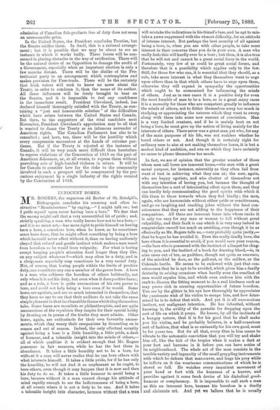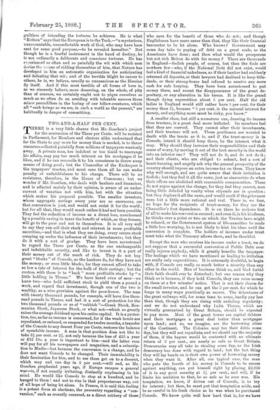INNOCENT BORES.
MR. ROGERS, the sagacious old Rector of St. Botolph's, Bishopsgate, concludes his amusing and often in- structive " Reminiscences " by saying,—" I might talk on ; but I pride myself upon never having been a bore." We fear that the enemy might call that a very nnsanctified bit of pride ; and, strictly speaking, a man who really knows how not to be a bore,— and it is no mean art,—has more right to pride himself on having been a bore, a conscious bore, when he knew, as he sometimes must have done, that he might effect something by being a bore which he could never effect without it, than on having uniformly obeyed that refined and gentle instinct which makes a man recoil from boredom as he would from vulgarity. For what is boring except keeping people's attention fixed longer than they like, on any subject whatever P—which may often be a duty, and in a clergyman especially may sometimes be a very sacred duty. Not, of course, that boring people within the limits of positive duty, can constitute any one a member of the genus bore. A bore is a man who achieves the boredom of others habitually, not only when it is not his duty, but even when it does positive harm ; and as a rule, a bore is quite unconscious of his own power to bore, and could not help being a bore even if he would. Some bores are egotists, and are so much interested in themselves, that they have no eye to see that their auditors do not take the same simple pleasure in that inexhaustible theme which they themselves take. Some bores are moralists or philanthropists, and are quite unconscious of the repulsion they inspire for their special hobby by droning on in praise of the truths they most admire. Other bores, again, are enthusiasts for their own favourite amuse- ments, which they weary their companions by descanting on in season and out of season. Indeed, the only effectual security against being a bore is a little humility, a little pride, a dash of humour, and a tolerable insight into the minds of others,— all of which qualities it is evident enough that Mr. Rogers
possesses in fair measure, while he has the last three in abundance. It takes a little humility not to be a bore, for without it a man will never realise that he can bore others with
what interests himself. It takes a little pride, for if he has only the humility, he will not find it so unpleasant as he ought, to
bore others, even though it may happen that it is now and then his duty to do so. It takes a little humour to avoid being a bore, because without it a man cannot change his attitude of
mind rapidly enough to see the ludicrousness of being a bore, at all events where it is not a duty to be one. And it takes a tolerable insight into character, because without that a man will mistake the indications in his friend's face, and be apt to mis- take a yawn suppressed with the utmost difficulty, for an attitude of intense interest. But perhaps the best security of all against being a bore, is, when you are with other people, to take more interest in their concerns than you do in your own. A man who really feels this will hardly ever be a bore ; bat then, it is also true that he will not and cannot be a great social force in the world. Fortunately, very few of us could be great social forces, and therefore that is a possibility which applies only to the few. Still, for those few who can, it is essential that they should, as a rule, take more interest in what they themselves want to urge upon others than in that which others have to urge upon them, otherwise they will expend in sympathy the opportunities which ought to be economised for influencing the minds of others. Just as in rare cases it is a positive duty for even the most humble of men to be a bore, so in a great many cases it is a necessity for those who are competent greatly to influence the minds of others, not to fritter themselves away too much in studying or appreciating the natures which they want to sweep along with them into some new current of conviction. Man is a very limited creature, and if he is mainly bent on not being a bore, he must give up the notion of living mainly for the interests of others. There never was a great man yet who, for any of the main purposes of his life, was not reckless whether he bored others or not. And though it is certainly right for ordinary men to aim at not making themselves bores, it is but a modest kind of ambition, and one on which they have certainly no cause to plume themselves too much.
In fact, we are of opinion that the greater number of those whom men call bores are innocent bores,—the men with a great moral purpose, for instance, miserably as they often fail from want of tact in achieving what they aim at; the men, again, who are happy egotists, and who chatter of themselves not with any intention of boring you, but because the thought of themselves has a sort of intoxicating effect upon them, and they can hardly help communicating the good spirits with which it fills them to those towards whom they feel kindly ; the men, again, who are humonrists without either pride or sensitiveness, and go on laughing and cracking jokes without the least con- sciousness that they are not adding to the happiness of their companions. All these are innocent bores into whose ranks it is only too easy for any man or woman to fall without great culpability, and their fault is one which it is very easy indeed to congratulate oneself too much on avoiding, even though it be as effectually as Mr. Rogers tells us,—very probably quite justly,— that be hopes he has avoided it. Even the really deadly bore, the bore whom it is essential to avoid, if you would save your reason, —the bore who is possessed with the instinct of a limpet for cling- ing to you, and the instinct of a leech for drawing blood,—is, in nine cases out of ten, as guiltless, though not quite as unaware, of the mischief he does, as the gall-nut, or the mildew, or the Colorado beetle. He seems to be endowed with just that con- sciousness that he is apt to be avoided, which gives him a deadly dexterity in seizing occasions when hardly even the cruellest of men would repulse him, and which even endows him with the craft to discern the fitting moment to do a real kindness such as may prove rich in securing opportunities of future boredom. You see by the glitter in his eye how thoroughly he appreciates the passionate wish of his victim to escape him, and how deter- mined he is to defeat that wish. And yet it is all unconscious instinct, not malignant intention. He has inherited, without knowing it, the avidity of the parasite for dropping upon the sort of life on which it preys. He knows, by all the instincts of a hungry nature, that it is for his good that he shall make you his victim, and he probably believes, in a half-conscious sort of fashion, that what is so eminently for his own good, must be for yours too. Bat for all that, every fibre in him seems to vibrate to the automatic conviction that you will try and shake him off, like the tick of the tropics when it makes a dart at your foot and burrows in it before you can have notice of its neighbourhood. The whole art of the man consists in the terrible variety and ingenuity of the small grappling instruments with which he defeats that manoeuvre, and hugs his prey while be inflicts on it the wearisome communications of which he is stored so full. He watches every impatient movement of your hand or foot with the keenness of a hunter, and provides against it some fresh device of his diabolical good- humour or complacency. It is impossible to call such a man as this an innocent bore, because his boredom is a deadly and elaborate art. And yet we believe that he is usually
guiltless of intending the tortures he achieves. He is what " Eothen " says that the European is to the Turk,—" a mysterious, unaccountable, uncomfortable work of God, who may have been sent for some good purpose,—to be revealed hereafter." But though he is a fearful instrument in the hand of destiny, he is not ordinarily a deliberate and conscious torturer. He has experienced so often and so painfully the wit with which men devise the means of ridding themselves of him, that Nature has developed in him an automatic organisation for anticipating and defeating that wit; and of the terrible blight he causes to others, he is, we believe, usually as unconscious as the Hessian fly itself. And if this most terrible of all forms of bore is, as we sincerely believe, more deserving, on the whole, of pity than of censure, we certainly ought not to pique ourselves so much as we often do on avoiding with tolerable success those minor peccadilloes in the boring of our fellow-creatures, which all "such beings as we are, in such a world as the present," are habitually in danger of committing.







































 Previous page
Previous page